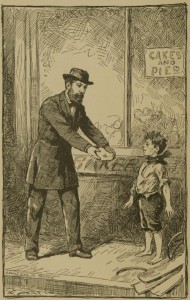The other day, a friend of mine passed by Provigo as she hurried home from campus, anxious to escape the bitter wind. An elderly homeless man sat by the doors of the grocery store, shivering, his wide and gentle eyes looking up at her. For a brief moment, their eyes met, but she quickly scurried to the warmth of her home. The next day, she walked into Provigo, bought a sandwich and coffee and placed it in front of the sleeping man. Why?
Random acts of kindness are on the rise. These selfless acts exist for the purpose of cheering up someone else, be it friend or stranger. This act of beauty, spontaneous or planned, brings humanity together in a celebration of compassion and kindness.
The phenomenon works wonders. A mere compliment or free coffee from a benevolent stranger can turn the most miserable day into a wonderful one. This was brought to life on December 3rd when a group of McGill students in Anita Novak’s Social Enterprise & Innovation class hosted an event called ‘McGill Pays it Forward.’ A multitude of activities, including free hugs and compliments, a silent disco party, and a ‘bucket list chalkboard’ brought together McGill students to spread kindness and love. The best part? After being bombarded with these acts of kindness, you couldn’t help but pass it onto your library cubicle neighbour, or an individual walking down the street, or that homeless man outside Provigo.
The irony, of course, is that the giver gains more than the receiver. A distinct feeling of joy and pride swells in your chest, knowing that you’re the reason for the smile on someone else’s face. Psychologists like economists, sociologists and biologists, live in the realm of ‘ists’ and are therefore fond of crafting theories. In true ‘ist’ fashion, psychologists have created the theory of psychological egoism, which suggests that pure altruism does not exist due to the intrinsic reward we naturally receive by performing any kind act. We help others due to the personal benefits we expect (subconsciously, perhaps) to receive. These acts also fulfill an underlying desire to boost our self-esteem. How much must we give to a homeless man until we feel good about ourselves? In fact, an altruistic act may be an illusion. Perhaps it’s just selfishness wearing a wig and fake glasses, seeking gratification or karma points.
Why bother being kind at all? It’s a dog-eat-dog world out there and getting ahead of the competition plays an important role in our day-to-day behaviour. Instead of helping strangers with their groceries or holding the door open from a mile away (as Canadians oft do), rush to your class to get a front row seat. For this will lead to the A, the 4.0 and that top-notch job. If someone hurts you, don’t offer forgiveness, but instead seek revenge.
But alas, this is not the answer. Though revenge might be sweet, what lingers is a bitter aftertaste. Likewise, racing through life is fruitless if we don’t enjoy the journey along the way. And the best way to relish the journey and increase our happiness is through the act of giving. Why is deriving a sense of self-satisfaction bad? In fact, the beauty of giving lies in the fact that it simultaneously increases our own happiness.
Giving, sharing and receiving: the epitome of the holiday season. Along with the strings of bright lights that adorn the streets, the jolly holiday tunes blasting in the malls and the deliciousness of Christmas in a cup (read: Starbucks drinks) comes an increase in random acts of kindness. It’s that magical time of the year when love trumps all. We donate our extra change to charity, reach out to family and loved ones, and smile at the little children lined up to see Santa.
These soul-enriching acts spread kindness and create an atmosphere of benevolence and compassion. Altruism has the potential to create bottom-up change, and the fact that we benefit from it makes it all the better. It might not be true altruism, but maybe that’s okay. So the next time you’re feeling blue, give a sandwich to a homeless person and see what happens.
The views expressed in this opinion piece are the author’s own and do not necessarily represent those of The Bull & Bear.


